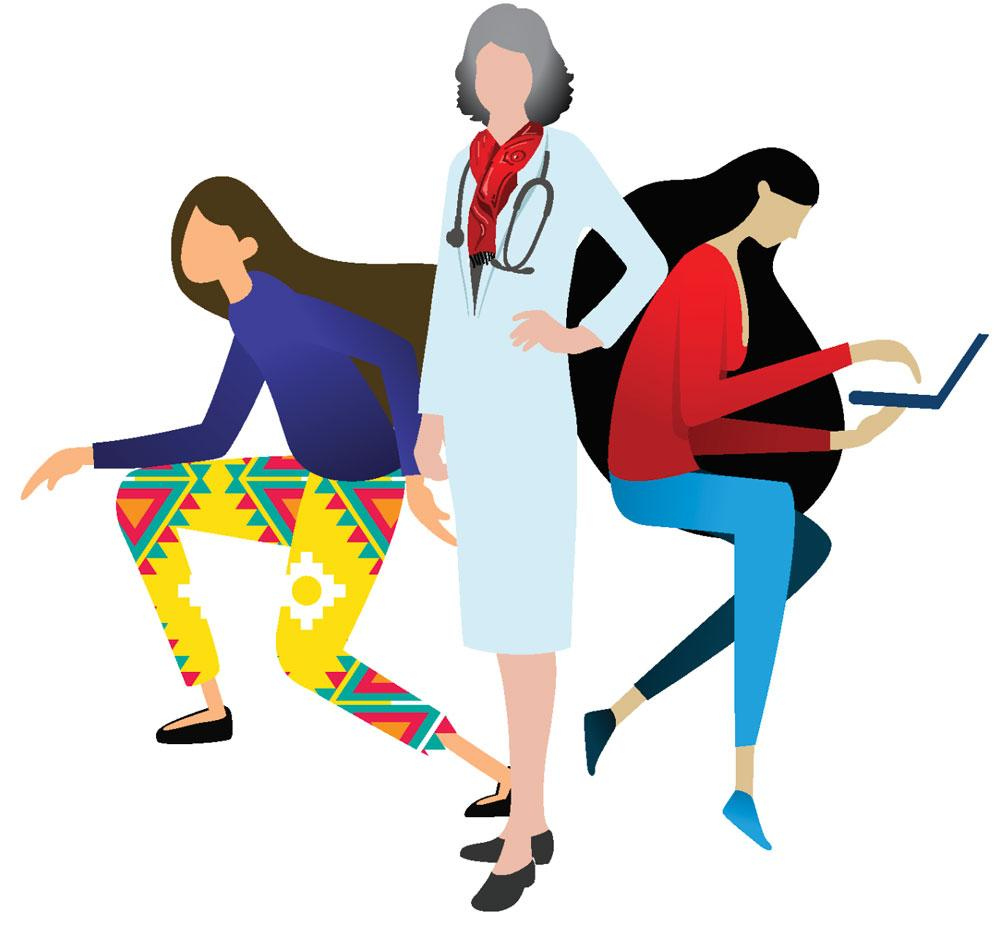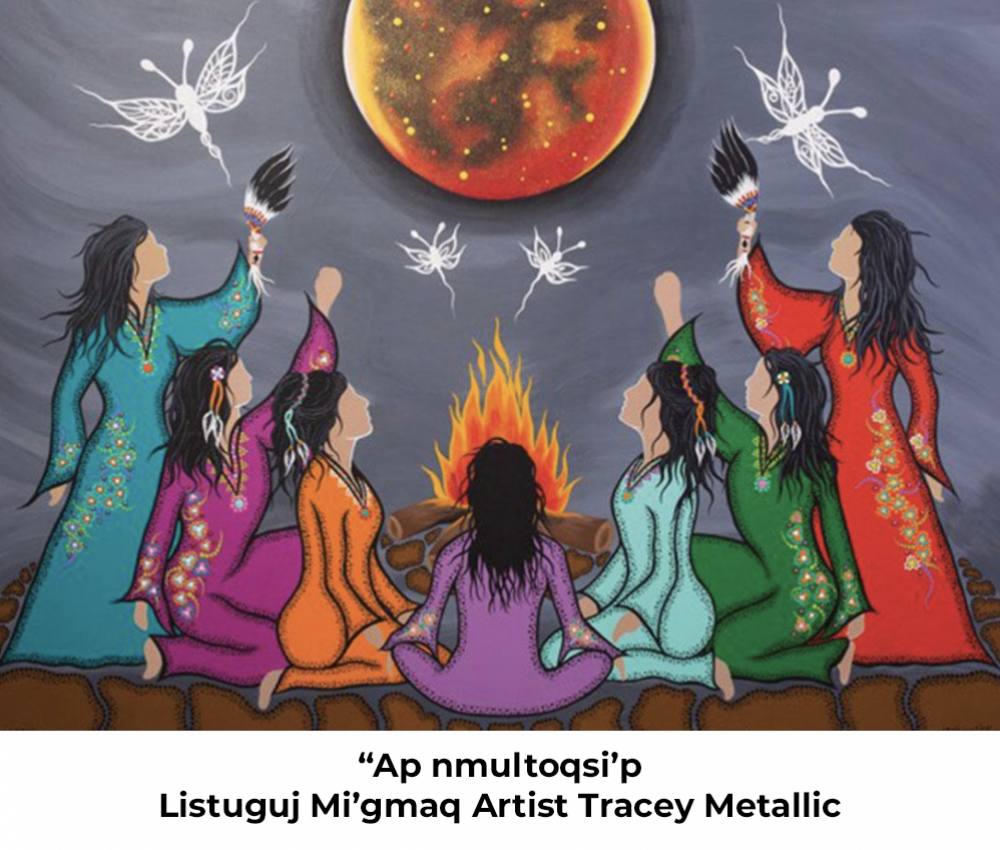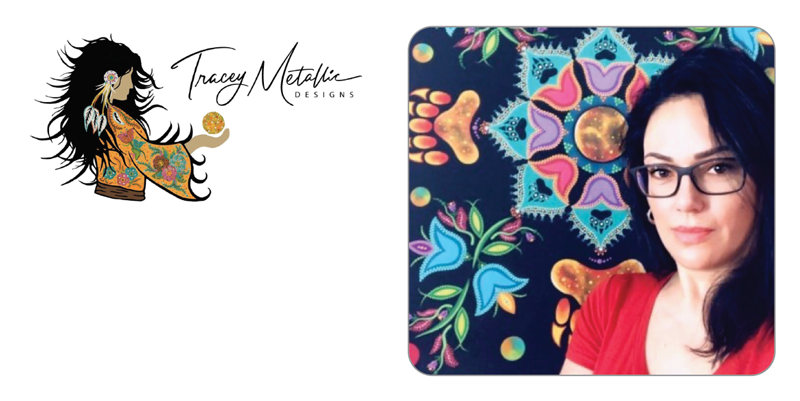6.2 Indigenous Women Entrepreneurs
![]()
5 MIN READ
Did you know that there are approximately 23,000 Indigenous women entrepreneurs in Canada and that Indigenous women are twice as likely to start a business compared to other women in the country?1
 Acknowledgment
Acknowledgment
We would like to acknowledge that members of the Leading Lenders project all live, work and play on the traditional unceded territories of the Mi’gmaq of Gespe’gewa’gi First Nation, located in the Peace and Friendship treaty region of what is now known as Northern New Brunswick and Eastern Quebec.
We recognize Canadian Indigenous women’s incredible diversity. The general term “Indigenous women” is used throughout this document and includes First Nations as well as Métis and Inuit people — acknowledging that various Indigenous populations have unique cultures, histories and personal experiences.
Key facts about Indigenous women entrepreneurs:
 Business ownership: Most Indigenous women entrepreneurs (over 60%) are sole proprietors of their businesses.2
Business ownership: Most Indigenous women entrepreneurs (over 60%) are sole proprietors of their businesses.2 Business sector: 74% of Indigenous women operate in the service sector, including retail, accommodation, tourism, arts, entertainment, recreation and restaurants.3
Business size: 38% of Indigenous women-owned businesses have fewer than four employees, and 58% don’t have any employees. This indicates the prominence of micro-enterprises among Indigenous women.4
Workforce: Indigenous women are nearly twice as likely as Indigenous men to hire Indigenous people exclusively.5
Location: 30% of Indigenous women-owned businesses are located on reserves.6
Age: 30% of Indigenous women entrepreneurs are between 26 to 40 years of age, making this overall group of entrepreneurs one of the youngest in the country.7
 History/culture: 73% of Indigenous women entrepreneurs confirmed that they draw on traditional cultural expressions and knowledge when running their businesses.8
History/culture: 73% of Indigenous women entrepreneurs confirmed that they draw on traditional cultural expressions and knowledge when running their businesses.8
Primary motivations for Indigenous women entrepreneurs:9
- Independence, balance and flexibility
- Passionate about creating products/services
- Seek economic independence
- Be involved and have leadership roles within their communities
Barriers to entrepreneurship
Indigenous women and other women entrepreneurs across Canada face many of the same barriers, however, the intergenerational trauma that many Indigenous women entrepreneurs continue to face has a major impact on their entrepreneurial journeys.
Indigenous women entrepreneurs have additional barriers directly related to their realities, including the following;
Financing: The number of lending institutions is often limited in Indigenous communities. More importantly, traditional lending institutions and government programs don’t always meet Indigenous women entrepreneurs’ needs. Many factors discourage or disqualify Indigenous women from applying for financing, such as:10
- Having a micro-enterprise and/or a part-time business
- Lack of access to micro-loans
- High interest rates
- Lack of collateral
- Operating in a high-risk sector
- Grant ineligibility due to political/systemic barriers
- Not owning an incorporated business
Political/systemic barriers: Indigenous entrepreneurs must operate within a restrictive legal framework. Federal laws, mainly the Indian Act,11 greatly limit business operations on reserves, while legislative subtleties can lead to a lack of understanding among entrepreneurs, for example:12
- Personal property on a reserve cannot be used as collateral. (Section 89 of Indian Act)
Relationship with money: Some Indigenous women grow up amid financial insecurity. Many studies and testimonials confirm this complicates the relationship with money, which could impact the management of business finances.13
Biases/stereotypes: Indigenous people, including Indigenous women entrepreneurs, face biases and stereotypes that date back many generations.14
History/culture: In the Westernized concept of entrepreneurship, success is often related to money and profit; this can be inconsistent with Indigenous cultures, which typically attach great importance to community and collective components. Over 80% of Indigenous women entrepreneurs confirmed that community relationships are key to their business success.15
Education/training: Some Indigenous communities don’t have the same access to quality education or the same training opportunities as other Canadians. This can complicate their entrepreneurial careers and reduce their financial literacy. In contrast with the Canadian trend, Indigenous women typically have lower education levels than Indigenous men.16
Mentoring/networking: Indigenous women entrepreneurs may have limited or no access to mentors and networks, especially if they are seeking a connection with Indigenous women. Thirty percent (30%) of Indigenous women entrepreneurs maintain that their main challenge is their lack of mentoring opportunities.17
Access to infrastructure/technologies: Many Indigenous communities don’t have access to essential infrastructure and modernized technology like other Canadians, including roads, housing, drinking water, high-speed Internet and many other key services and amenities.18
Family/community roles: Not only do Indigenous women typically have more family responsibilities, but many of them also have leadership roles in their communities. Studies also show that Indigenous women are more likely to have children at a younger age, to be single mothers and to have larger families. These multiple roles may have an influence on Indigenous women entrepreneurs’ needs and motivations.19
Lack of confidence: This feeling is inextricably linked to other barriers because it often reflects the cumulative impact of multiple obstacles. Due to the challenges they face, many Indigenous women entrepreneurs often feel less confident and devalue their own business management abilities.20
Tips to support Indigenous women entrepreneurs:
 Know the political and systemic limitations: Political and systemic barriers, such as the Indian Act, pose significant business financing challenges for Indigenous entrepreneurs. Being more aware of these challenges could help lending institutions and lenders find new or alternative financing options that take those limitations into account.
Know the political and systemic limitations: Political and systemic barriers, such as the Indian Act, pose significant business financing challenges for Indigenous entrepreneurs. Being more aware of these challenges could help lending institutions and lenders find new or alternative financing options that take those limitations into account. Provide appropriate services: A lack of access to financial services can certainly hinder Indigenous women’s entrepreneurial goals. Lenders and lending institutions could consider making services more accessible, either by visiting reserves, opening branches closer to Indigenous communities or making business financing eligibility criteria more flexible for Indigenous entrepreneurs.
Provide appropriate services: A lack of access to financial services can certainly hinder Indigenous women’s entrepreneurial goals. Lenders and lending institutions could consider making services more accessible, either by visiting reserves, opening branches closer to Indigenous communities or making business financing eligibility criteria more flexible for Indigenous entrepreneurs. Forge a meaningful relationship: Indigenous women entrepreneurs typically prefer a relationship-based approach, rather than a transactional one. Many do not prefer to be constantly redirected to multiple service providers. Forge a meaningful relationship with Indigenous women entrepreneurs by supporting them throughout the entire financing process.21
Forge a meaningful relationship: Indigenous women entrepreneurs typically prefer a relationship-based approach, rather than a transactional one. Many do not prefer to be constantly redirected to multiple service providers. Forge a meaningful relationship with Indigenous women entrepreneurs by supporting them throughout the entire financing process.21 Boost financial literacy: Low levels of financial literacy are a challenge for many Indigenous women entrepreneurs and are directly linked to their lack of confidence. Tool 7.1 offers practical tips about financial literacy.
Boost financial literacy: Low levels of financial literacy are a challenge for many Indigenous women entrepreneurs and are directly linked to their lack of confidence. Tool 7.1 offers practical tips about financial literacy.Interested to learn more about Indigenous women entrepreneurs?
The following two reports by the Women Entrepreneurship Knowledge Hub (WEKH) present the findings of recent research on Canadian Indigenous women entrepreneurs:
- Breaking Barriers, A Decade of Indigenous Women’s Entrepreneurship in Canada
- Mikwam Makwa Ikwe (Ice Bear Woman), A National Needs Analysis on Indigenous Women’s Entrepreneurship

Leading Lenders is in partnership with the Women Entrepreneurship Knowledge Hub (WEKH), a network of 10 regional hubs and over 250 organizations established as part of the Government of Canada’s Women Entrepreneurship Strategy.
Stakeholder Engagement Group
To create the “Indigenous Women Entrepreneurs” sub tool, Leading Lenders invited stakeholders to review our material and to share their knowledge and insight — to help ensure this sub tool is comprehensive and representative of the barriers that Indigenous women entrepreneurs face when pursuing business financing. We gratefully acknowledge the time and input from the following individuals: Victoria Labillois
Victoria Labillois
President - Wejuseg Construction
Board Member - The National Indigenous Economic Development Board
Advisor - Circle of Abundance at the Coady Institute
Learn more Natasha Martin-Mitchell
Natasha Martin-Mitchell
Development Officer, Indigenous Women Entrepreneurs - Women in Business New Brunswick
Learn more Tracey Metallic
Tracey Metallic
Artist / Entrepreneur
Listuguj Mi’gmaq First Nation
Learn more Ashley Richard
Ashley Richard
Indigenous Outreach and Partnership Development - Women Entrepreneurship Knowledge Hub
Learn more
2Women Entrepreneurship Knowledge Hub and Canadian Council for Aboriginal Business (December 2020). Breaking Barriers, A decade of Indigenous women’s entrepreneurship in Canada, Toronto, Diversity Institute, Toronto Metropolitan University, p. ii.; Women Entrepreneurship Knowledge Hub (2020). The State of Women’s Entrepreneurship in Canada 2020, Toronto, Diversity Institute, Toronto Metropolitan University, p. 41.
3Women Entrepreneurship Knowledge Hub and Asper School of Business (January 2021). Mikwam Makwa Ikwe (Ice Bear Woman), A National Needs Analysis on Indigenous Women’s Entrepreneurship. Toronto, Diversity Institute, Toronto Metropolitan University and University of Manitoba, p. 4.; Women Entrepreneurship Knowledge Hub and Canadian Council for Aboriginal Business (September 2020). Indigenous Women Entrepreneurs: Preliminary Report. Toronto, Diversity Institute, Toronto Metropolitan University, p. 5.; Women Entrepreneurship Knowledge Hub (2020). The State of Women’s Entrepreneurship in Canada 2020, Toronto, Diversity Institute, Toronto Metropolitan University, p. 42.
4Women Entrepreneurship Knowledge Hub and Asper School of Business (January 2021). Mikwam Makwa Ikwe (Ice Bear Woman), A National Needs Analysis on Indigenous Women’s Entrepreneurship. Toronto, Diversity Institute, Toronto Metropolitan University and University of Manitoba, p. 4.; Women Entrepreneurship Knowledge Hub and Canadian Council for Aboriginal Business (December 2020). Breaking Barriers, A decade of Indigenous women’s entrepreneurship in Canada, Toronto, Diversity Institute, Toronto Metropolitan University, p. ii.
5Women Entrepreneurship Knowledge Hub and Canadian Council for Aboriginal Business (December 2020). Breaking Barriers, A decade of Indigenous women’s entrepreneurship in Canada, Toronto, Diversity Institute, Toronto Metropolitan University, p. iii.
6Women Entrepreneurship Knowledge Hub and Canadian Council for Aboriginal Business (December 2020). Breaking Barriers, A decade of Indigenous women’s entrepreneurship in Canada, Toronto, Diversity Institute, Toronto Metropolitan University, p. 8.
7Helen Bobiwash (July 2020). Indigenous Women Entrepreneurs in Canada: Summary of National Survey Findings, National Aboriginal Capital Corporations Association, Indigenous Women Entrepreneurship Working Group, https://nacca.ca/wp-content/uploads/2020/07/NACCA-IWE-Survey-Report.pdf (page consulted November 18th 2020), p. 10.; Women Entrepreneurship Knowledge Hub and Asper School of Business (January 2021). Mikwam Makwa Ikwe (Ice Bear Woman), A National Needs Analysis on Indigenous Women’s Entrepreneurship. Toronto, Diversity Institute, Toronto Metropolitan University and University of Manitoba, p. 4.
8Women Entrepreneurship Knowledge Hub and Canadian Council for Aboriginal Business (December 2020). Breaking Barriers, A decade of Indigenous women’s entrepreneurship in Canada, Toronto, Diversity Institute, Toronto Metropolitan University, p. iii.
9Helen Bobiwash (July 2020). Indigenous Women Entrepreneurs in Canada: Summary of National Survey Findings, National Aboriginal Capital Corporations Association, Indigenous Women Entrepreneurship Working Group, https://nacca.ca/wp-content/uploads/2020/07/NACCA-IWE-Survey-Report.pdf (page consulted November 18th 2020), p. 11, 19.
10Helen Bobiwash (July 2020). Indigenous Women Entrepreneurs in Canada: Summary of Literature Review, National Aboriginal Capital Corporations Association, Indigenous Women Entrepreneurship Working Group,https://nacca.ca/wp-content/uploads/2020/07/NACCA-IWE-Literature-Review-Report.pdf (page consulted November 19th 2020), p. 20.; Helen Bobiwash (July 2020). Indigenous Women Entrepreneurs: Valuable Investments in Their Businesses, Families and Communities, National Aboriginal Capital Corporations Association, Indigenous Women Entrepreneurship Working Group, https://nacca.ca/wp-content/uploads/2020/07/NACCA-IWE-Summary-Report.pdf (page consulted November 19th 2020), p. 7.; Women Entrepreneurship Knowledge Hub and Asper School of Business (January 2021). Mikwam Makwa Ikwe (Ice Bear Woman), A National Needs Analysis on Indigenous Women’s Entrepreneurship. Toronto, Diversity Institute, Toronto Metropolitan University and University of Manitoba, p. 7.
11Indian Act, R.S.C. (1985), ch I-5, 1985, https://laws-lois.justice.gc.ca/PDF/I-5.pdf
12Helen Bobiwash (July 2020). Indigenous Women Entrepreneurs in Canada: Summary of Literature Review, National Aboriginal Capital Corporations Association, Indigenous Women Entrepreneurship Working Group,https://nacca.ca/wp-content/uploads/2020/07/NACCA-IWE-Literature-Review-Report.pdf (page consulted November 19th 2020), p. 21.; Helen Bobiwash (July 2020). Indigenous Women Entrepreneurs: Valuable Investments in Their Businesses, Families and Communities, National Aboriginal Capital Corporations Association, Indigenous Women Entrepreneurship Working Group, https://nacca.ca/wp-content/uploads/2020/07/NACCA-IWE-Summary-Report.pdf (page consulted November 19th 2020), p. 7.; Women Entrepreneurship Knowledge Hub and Asper School of Business (January 2021). Mikwam Makwa Ikwe (Ice Bear Woman), A National Needs Analysis on Indigenous Women’s Entrepreneurship. Toronto, Diversity Institute, Toronto Metropolitan University and University of Manitoba, p. 7, 14.; Women Entrepreneurship Knowledge Hub (2020). The State of Women’s Entrepreneurship in Canada 2020, Toronto, Diversity Institute, Toronto Metropolitan University, p. 42.
13Canadian Women’s Chamber of Commerce and Women Entrepreneurship Knowledge Hub (December 2020). Webinar: Financial Literacy 101, session # 4, Applying an Intersectional Gender Lens to Access to Capital, https://www.youtube.com/watch?v=nqX3sc5gNEg (webinar offered December 9th 2020).; Women Entrepreneurship Knowledge Hub and Asper School of Business (January 2021). Mikwam Makwa Ikwe (Ice Bear Woman), A National Needs Analysis on Indigenous Women’s Entrepreneurship. Toronto, Diversity Institute, Toronto Metropolitan University and University of Manitoba, p. 6.
14Women Entrepreneurship Knowledge Hub and Asper School of Business (January 2021). Mikwam Makwa Ikwe (Ice Bear Woman), A National Needs Analysis on Indigenous Women’s Entrepreneurship. Toronto, Diversity Institute, Toronto Metropolitan University and University of Manitoba, p. 9.
15Women Entrepreneurship Knowledge Hub and Asper School of Business (January 2021). Mikwam Makwa Ikwe (Ice Bear Woman), A National Needs Analysis on Indigenous Women’s Entrepreneurship. Toronto, Diversity Institute, Toronto Metropolitan University and University of Manitoba, p. 6, 12.; Women Entrepreneurship Knowledge Hub and Canadian Council for Aboriginal Business (September 2020). Indigenous Women Entrepreneurs: Preliminary Report. Toronto, Diversity Institute, Toronto Metropolitan University, p. 9.
16Helen Bobiwash (July 2020). Indigenous Women Entrepreneurs in Canada: Summary of Literature Review, National Aboriginal Capital Corporations Association, Indigenous Women Entrepreneurship Working Group,https://nacca.ca/wp-content/uploads/2020/07/NACCA-IWE-Literature-Review-Report.pdf (page consulted November 19th 2020), p. 21.; Michael Mendelson (October 2006). Improving primary and secondary education on reserves in Canada, Caledon Institute of Social Policy, ISBN # 1-55382-207-2, https://maytree.com/wp-content/uploads/608ENG.pdf (page consulted February 4th 2021).; Women Entrepreneurship Knowledge Hub and Asper School of Business (January 2021). Mikwam Makwa Ikwe (Ice Bear Woman), A National Needs Analysis on Indigenous Women’s Entrepreneurship. Toronto, Diversity Institute, Toronto Metropolitan University and University of Manitoba, p. 19.
17Helen Bobiwash (July 2020). Indigenous Women Entrepreneurs in Canada: Summary of National Survey Findings, National Aboriginal Capital Corporations Association, Indigenous Women Entrepreneurship Working Group, https://nacca.ca/wp-content/uploads/2020/07/NACCA-IWE-Survey-Report.pdf (page consulted November 18th 2020), p. 20.; Women Entrepreneurship Knowledge Hub and Asper School of Business (January 2021). Mikwam Makwa Ikwe (Ice Bear Woman), A National Needs Analysis on Indigenous Women’s Entrepreneurship. Toronto, Diversity Institute, Toronto Metropolitan University and University of Manitoba, p. 14, 15 and 17.
18Helen Bobiwash (July 2020). Indigenous Women Entrepreneurs in Canada: Summary of National Survey Findings, National Aboriginal Capital Corporations Association, Indigenous Women Entrepreneurship Working Group, https://nacca.ca/wp-content/uploads/2020/07/NACCA-IWE-Survey-Report.pdf (page consulted November 18th 2020), p. 20.; Helen Bobiwash (July 2020). Indigenous Women Entrepreneurs: Valuable Investments in Their Businesses, Families and Communities, National Aboriginal Capital Corporations Association, Indigenous Women Entrepreneurship Working Group, https://nacca.ca/wp-content/uploads/2020/07/NACCA-IWE-Summary-Report.pdf (page consulted November 19th 2020), p. 5.; Women Entrepreneurship Knowledge Hub and Asper School of Business (January 2021). Mikwam Makwa Ikwe (Ice Bear Woman), A National Needs Analysis on Indigenous Women’s Entrepreneurship. Toronto, Diversity Institute, Toronto Metropolitan University and University of Manitoba, p. 21.; Women Entrepreneurship Knowledge Hub (2020). The State of Women’s Entrepreneurship in Canada 2020, Toronto, Diversity Institute, Toronto Metropolitan University, p. 55.
19The Beacon Agency (March 2018) Everywhere, Every Day Innovating: Women Entrepreneurs and Innovation Report, with Carleton University, BMO Financial Group, Innovation, Science, and Economic Development Canada and Indigenous and Northern Affaires Canada, p. 30.; Helen Bobiwash (July 2020). Indigenous Women Entrepreneurs in Canada: Summary of Literature Review, National Aboriginal Capital Corporations Association, Indigenous Women Entrepreneurship Working Group,https://nacca.ca/wp-content/uploads/2020/07/NACCA-IWE-Literature-Review-Report.pdf (page consulted November 19th 2020), p. 20.; Helen Bobiwash (July 2020). Indigenous Women Entrepreneurs in Canada: Summary of National Survey Findings, National Aboriginal Capital Corporations Association, Indigenous Women Entrepreneurship Working Group, https://nacca.ca/wp-content/uploads/2020/07/NACCA-IWE-Survey-Report.pdf (page consulted November 18th 2020), p. 15, 20.; Helen Bobiwash (July 2020). Indigenous Women Entrepreneurs: Valuable Investments in Their Businesses, Families and Communities, National Aboriginal Capital Corporations Association, Indigenous Women Entrepreneurship Working Group, https://nacca.ca/wp-content/uploads/2020/07/NACCA-IWE-Summary-Report.pdf (page consulted November 19th 2020), p. 9.; Women Entrepreneurship Knowledge Hub and Asper School of Business (January 2021). Mikwam Makwa Ikwe (Ice Bear Woman), A National Needs Analysis on Indigenous Women’s Entrepreneurship. Toronto, Diversity Institute, Toronto Metropolitan University and University of Manitoba, p. 21.; Women Entrepreneurship Knowledge Hub and Canadian Council for Aboriginal Business (December 2020). Breaking Barriers, A decade of Indigenous women’s entrepreneurship in Canada, Toronto, Diversity Institute, Toronto Metropolitan University, p. 4.
20The Beacon Agency (March 2018) Everywhere, Every Day Innovating: Women Entrepreneurs and Innovation Report, with Carleton University, BMO Financial Group, Innovation, Science, and Economic Development Canada and Indigenous and Northern Affaires Canada, p. 30.; Women Entrepreneurship Knowledge Hub and Asper School of Business (January 2021). Mikwam Makwa Ikwe (Ice Bear Woman), A National Needs Analysis on Indigenous Women’s Entrepreneurship. Toronto, Diversity Institute, Toronto Metropolitan University and University of Manitoba, p. 22.
21Women Entrepreneurship Knowledge Hub and Asper School of Business (January 2021). Mikwam Makwa Ikwe (Ice Bear Woman), A National Needs Analysis on Indigenous Women’s Entrepreneurship. Toronto, Diversity Institute, Toronto Metropolitan University and University of Manitoba, p. 32.
All documents prepared for the LEADING LENDERS project were developed in line with the most appropriate and recent terminology. However, we recognize that terminology is subject to change over time. To the best of our ability, we have attempted to use terminology that respects the dignity and rights of all individuals.

